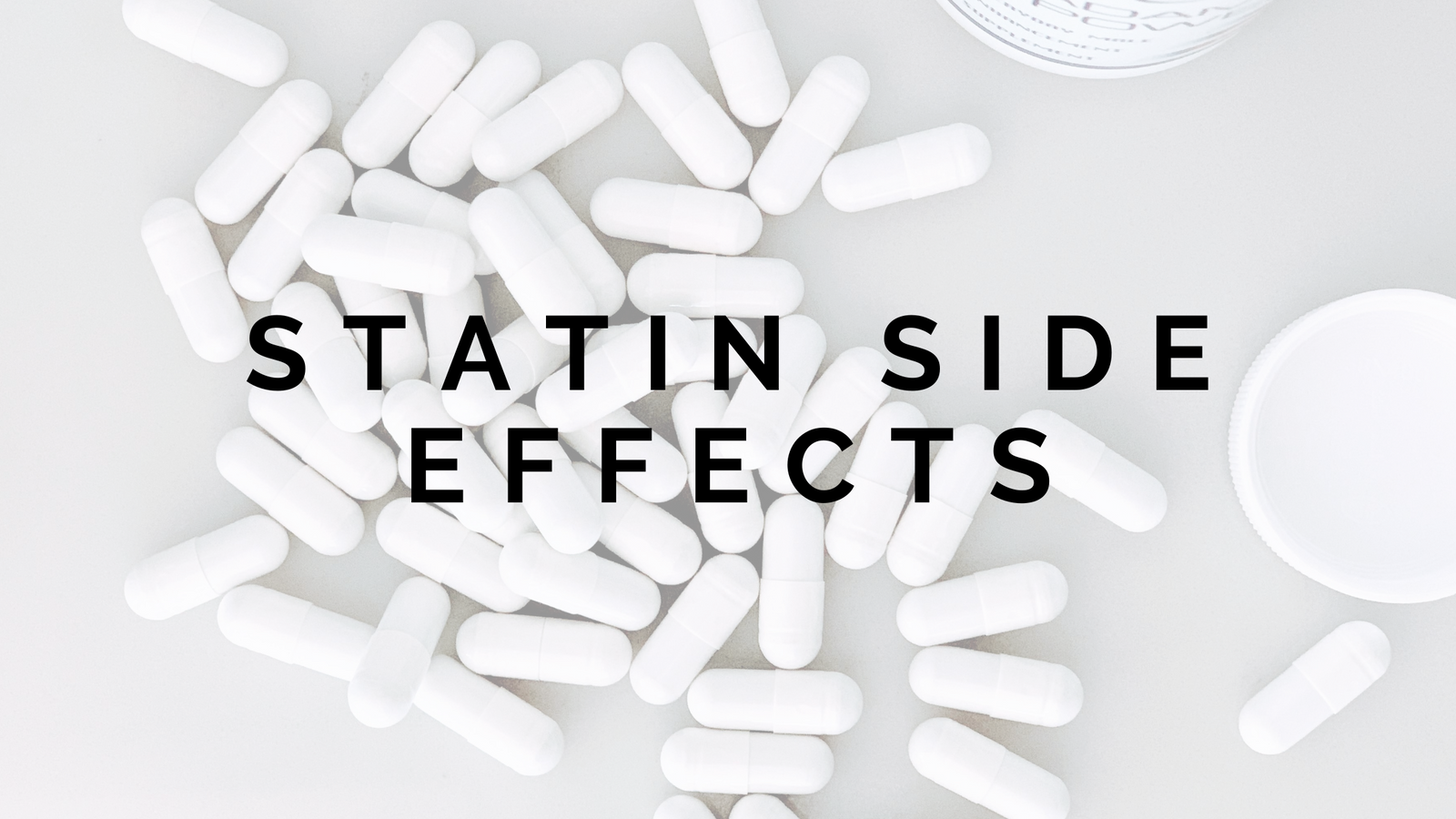Statin Side Effects

Are you taking statins to lower your cholesterol and prevent cardiovascular diseases such as heart attack, and stroke? If you are, you may often experience several negative side effects such as muscle pain, feelings of tiredness and weakness, along with other discomforts.
Some of the most commonly prescribed statins include: Atorvastatin (Lipitor), Fluvastatin (Lescol XL), Lovastatin (Altoprev), Pitavastatin (Livalo), Pravastatin (Pravachol), Rosuvastatin (Crestor, Ezallor), and Simvastatin (Zocor, FloLipid).
Although statins are proven to help reduce the risk of cardiovascular disease by lowering cholesterol, evidence has shown that between 40 to 75% of patients suspend their statin treatments within a year, due to some degree of intolerance and adverse effects that affect their quality of life.

Statins are medications synthetically obtained or derived from fungi, commonly prescribed to lower cholesterol, which is one of the main factors that cause cardiovascular diseases. According to the World Health Organization, cardiovascular disease takes the life of approximately 17.9 million people each year and are considered the main cause of death globally.
To put that into perspective, COVID-19 has tragically taken over 1.4 million lives globally, whereas Cardiovascular Disease take the life of approximately 17.9 million individuals per year.
Statins work by blocking the normal action of HMG-CoA reductase, a key enzyme responsible for producing cholesterol in the liver. Scientific studies have shown that this unnatural process in the body, may cause clinical manifestations of intolerance and toxicity, also known as side effects.
Here are the four main side effects associated with statin treatment:
1. Muscle disorders (myopathy):

Statins affect the muscles in the body that have voluntary movement. Symptoms include muscle pain, stiffness, soreness, loss of muscle strength during exertion, cramps, inflammation, and, in rare cases, death of muscle fibers that can lead to infarction of skeletal muscle. Statins block the mevalonate pathway that is not only responsible for cholesterol production but also other important reactions in your body. Therefore, scientists suggest that these drugs may affect the function of muscles by altering their mitochondrial membrane stability, protein structure, and blocking the production of muscle coenzyme Q10.
Tip: Try a coenzyme Q10 supplement. Coenzyme Q10 is an antioxidant that keeps the healthy mitochondrial function in your cells and may help relieve your muscle pain. Contact your doctor immediately if you have any of these muscle disorders while taking a statin therapy.
2. Increased risk of Type 2 Diabetes Mellitus:

Intensive-dose statin therapy increases the risk of type 2 diabetes mellitus by altering your normal blood glucose levels. Research has shown that when statins block the enzyme responsible to produce cholesterol in the liver, they also may affect other pathways that alter insulin secretion, normal levels of coenzyme Q10, calcium channel signaling of the pancreatic B-cells, and balance of insulin and glucagon hormones. All these processes play an important role in maintaining healthy blood glucose levels. There is a higher risk to develop type 2 diabetes if you have a fatty liver or insulin resistance.
Tip: Some symptoms you may feel are increased thirst, blurred vision, frequent urination, and slow healing of cuts or bruises. In some cases, people with type 2 diabetes caused by statin therapy don’t experience these symptoms, so ask your doctor for a regular checkup of your blood glucose levels.
3. Hemorrhagic stroke:

The mechanism by which statins increase the risk of hemorrhagic stroke remains unclear. However, patients under statin treatment, especially the ones with history of conditions that affect the blood flow in the brain (thrombosis, embolism, hemorrhage), commonly known as cerebrovascular diseases, have shown increased occurrence of hemorrhagic stroke. Hemorrhagic stroke occurs when an artery in the brain breaks and leaks blood in the surrounding tissue. This blood accumulates and puts pressure damaging the brain cells. Symptoms of hemorrhagic stroke include face drooping, arm weakness, and speech difficulty.
Tip: maintain regular control of your blood pressure and weight, and try to adopt a diet lower in sodium and higher in potassium. Balanced levels of potassium in the blood can protect the arteries against stiffness and could help to avoid deposits of plaque that reduce the normal blood flow and breakage of artery cell walls. Ask your doctor before taking any supplements.
4. Deficiency of Vitamin D:

Studies have shown the relationship between statin intake and vitamin D deficiency. Vitamin D is produced in our body using cholesterol in our skin cells in the presence of sunlight. Since stains block the synthesis of cholesterol in the liver, Vitamin D concentrations decrease. Vitamin D helps to regulate the absorption of calcium, magnesium, and phosphate in the body. Low (21–29 ng/mL) or deficient (⩽20 ng/mL ) vitamin D concentrations are associated with osteoporosis, muscle-related adverse effects, and depression.
Tip: Consider taking vitamin D especially if you live in a region with lower sun exposure. Each statin may affect vitamin D concentrations differently. Consult with your physician before taking any supplement.
Natural Strategies to Cholesterol Lowering Statins
There are different strategies that you can implement to help lower your cholesterol naturally, and thereby reducing your need to take statins. Of course, you should always consult with your doctor before making any changes to your prescription routine.
Cereal beta-glucan fiber has been extensively proven as one of the few effective supplements to naturally lower your LDL (bad) cholesterol levels. Cerabeta contains a high concentration of barley beta-glucan fiber, which is perfect for lowering cholesterol.
For more information on beta-glucan and other natural strategies to lower cholesterol, please feel free to view our other blog posts and website pages, linked below:
Natural Alternatives to Statins
How to Lower your Cholesterol Naturally
--
Sources:
https://www.sciencedirect.com/science/article/abs/pii/S0939475312001226
https://www.sciencedirect.com/science/article/abs/pii/S0939475317300431
https://pubmed.ncbi.nlm.nih.gov/27728862/
https://www.ahajournals.org/doi/full/10.1161/CIRCRESAHA.118.312782
https://pubmed.ncbi.nlm.nih.gov/22560377/
https://www.metabolismjournal.com/article/S0026-0495(14)00053-5/fulltext
https://www.who.int/health-topics/cardiovascular-diseases/#tab=tab_1
https://www.ahajournals.org/doi/10.1161/strokeaha.107.488791
https://www.sciencedirect.com/science/article/pii/S2214623716300503

